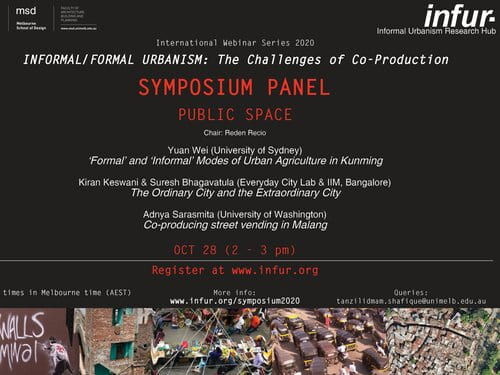
Oct 28, 2020 / InfUr Webinar 4 / Symposium Panel on “Public Space”
Symposium Panel on Public Space
Watch here …
Presenters / abstracts:
‘Formal’ and ‘Informal’ Modes of Urban Agriculture in Kunming
Yuan Wei, University of Sydney
The exponential growth of China’s urban sprawl has transformed the once arable land into cities with former rural villages. Several types of urban agriculture (UA) have emerged in urban areas due to the transformation of arable land. This presentation focusses on the case of Kunming in Yunnan Province where significant numbers of Village in the City – the non-formally developed former rural villages – and peri-urban residents continue to practice UA. Existing and new UA practices respond to urban pressures and bring into play innovative urban governance thinking, effectively integrating UA into local development and enriching alternative ways of revitalising and managing cities. UA in Kunming presents itself in different ways and at different scales in the private and public domain. On the one hand, the residents initiate ‘informal’ UA practices and adaptive planting in private and public spaces: household planting gardens on verandas, rooftops and window ledges. On the other hand, the Kunming Municipal Government has issued a series of policies since 2010 to promote and encourage the ‘formal’ UA practices that integrate the agricultural experience, entertainment, trading, and education. These UA practices represent divergent modes of production and different ways of governance in meeting diverse needs of city stakeholders. This presentation explores the changing role and nature of these UA practices in the urbanisation process including discussing opportunities for co-production.
The Ordinary City and the Extraordinary City
Kiran Keswani Everyday City Lab, Bangalore & Suresh Bhagavatula, Indian Institute of Management, Bangalore
Recent work on informal urbanism argues that informality shapes how global South cities grow, and needs to be a part of emergent urban theory. This paper builds upon this work, investigating how people informally shape the city through their everyday and periodic activities in public spaces. The research uses spatial ethnography to examine urban informality as an outcome of spatial and economic changes in a market precinct in Bangalore. The presentation will show that everyday practices within certain urban spaces have a temporal dimension. The ordinary city encapsulates how people use urban spaces on an everyday basis and the extraordinary city reflects how urban spaces are transformed during a periodic, religious and cultural festival. The paper derives relational measures of locational choice, tactics of informal vendors, and the economics of the space through an unpacking of the two situations. It draws upon the construct of the ‘common denominator’ and applies it to the everyday practices within these situations to develop an ordinary-extraordinary framework. The paper makes two key contributions: to show how developing this theoretical framework might add to our understanding of informal urbanism and to propose that it may be useful to have intermediate levels of planning that incorporate the conditions of the ordinary city and the extraordinary city.
Co-producing street vending in Malang
Adnya Sarasmita, University of Washington
This research on street vending in Malang, Indonesia offers an insight into the ways in which the nexus of informal/formal urbanism is manifested in everyday urban spaces. A formal regulatory framework exists on the municipal level, outlining where and when vending activities are not allowed to occur. Street vending, however, continues to operate informally within, or adjacent to, the formal spaces. Several cases suggest that the formal framework often has limited bearing on the everyday vending practices across the city. In instances where the formal framework intersects with everyday informality, several scenarios transpire. Whenever possible, street vendors will try to avoid contact. If that fails, direct confrontation with rule enforcement may ensue, in which the vendors are typically quelled – albeit temporarily. A less aggressive approach has been attempted through the co-production of a formalised street market. Although the formal-informal intersection in such approach may be seen as less hostile, it is still shaped by power imbalance, with street vendors expected to alter their practices and comply with formally imposed rules of conduct. To pursue a genuine co-production, the formal needs to engage the street vendors in a manner that preserves their agency, which may include informally occupying their everyday spaces, even in a formal framework.